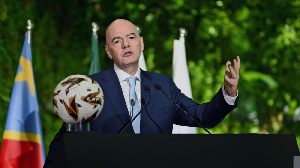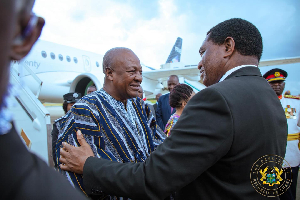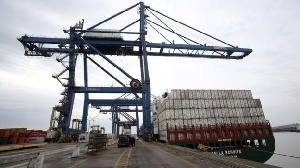The Country Representative of the IMF to Ghana Dr Albert Touna Mama has said that his outfit tries "as much as possible to stay out of debates" but they felt compelled to clarify statements made by Fact Check Ghana concerning the $1 billion IMF COVID-19 relief fund to the government.
Fact Check Ghana, an affiliate of the Media Foundation for West Africa, through its website, stated that government of Ghana presented data to the IMF which was different from figures in the annual budgets for 2018 and 2019.
According to Fact Check Ghana, the government of Ghana had in its budgets to Parliament for 2018 and 2019 presented fiscal deficits of 3.0% and 4.4% of GDP but changed the figures to 7.0% and 7.5% of GDP to the IMF for 2018 and 2019. For Gross International Reserve, Fact Check Ghana and the NDC also alleged that government quoted 6,800 and 8,100 for 2018 and 2019 in its budget to Parliament but changed the figures to 5,317 and 6,634 for the same period respectively to the IMF.
But speaking on Joy FM's news analyses programme News File on Saturday, the IMF Country Representative to Ghana, Dr. Albert Touna Mama suggested that Fact Check Ghana misrepresented the facts because the government was not the one that presented figures for fiscal deficit and gross international reserve the IMF published in its statements as Fact Check Ghana reported.
The IMF Country Director explained that the difference in figures was as a result of a difference in the methodology of calculation, adding that the figure in fiscal deficit in their statement was a figure they generated themselves from the data government presented to them, having added financial and energy sector payments in line with their methodology, which is different from government's methodology.
"Our number includes these two elements (financial sector payments and energy sector payment) and we know why the Governor of Bank of Ghana made the decision not to have these two elements in the fiscal deficits," said the IMF Country Rep.
On gross international reserve, the IMF Country representative said the differences in figures also bothered on a different method of calculating, and not necessarily an intent to hide figures on the part of the government.
He added that the IMF has been aware of the government's method of calculating the Gross International Reserve because the Central Bank Governor made that clear at the beginning of the year.
"The difference here is that Bank of Ghana accounts the oil fund; the heritage fund and the stabilisation fund as part of the gross international reserve and I think that point was clearly made at the beginning of the year by the Governor of the Bank of Ghana. That is the difference and that is the position that they have taken."
"The argument by the Bank of Ghana is that if push comes to shove and they need some additional buffers if you are in a situation of crisis, you can go to parliament and request access to the oil fund."
The IMF Country rep stressed that nothing has been hidden from his outfit by the government, adding that they have been aware of everything they needed to know.
"When it comes to the data we received that we worked with, in this debate, there is nothing new that we did not know about,"
"The comparison that I see is comparing two different things on one side and we are aware of these differences; they are not new."
"We can agree to disagree on the way we have to capture it but I think there is no new information here."
General News of Sunday, 10 May 2020
Source: www.ghanaweb.com
We felt compelled to clarify statements by Fact Check Ghana - IMF Country Rep
Opinions












